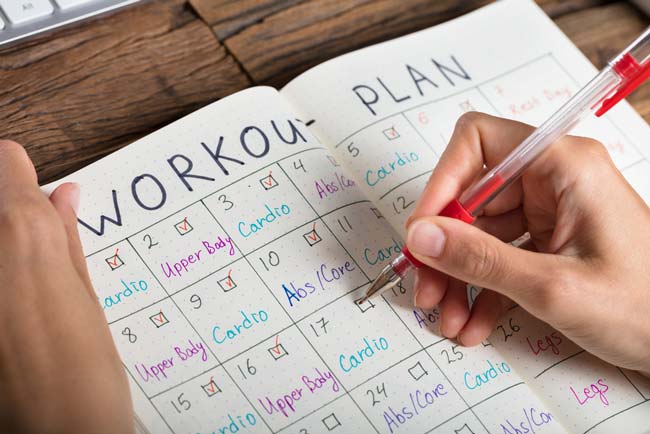
Charles Schmittdiel, Ph.D.
Increasing activity and exercise is an important part of your bariatric program, and promotes better health and well-being. Unfortunately, many people have been led to believe that you can lose large amounts of weight by exercise alone. It’s possible, but would require a lot of time in daily exercise. For example, 30 minutes of walking at 4+ miles an hour on a treadmill may burn 200-300 calories (depending on your weight), but that number of calories can be eliminated simply by eating less. To lose a pound in a week (approximately 3,500 calories) without changing your food intake could require being on the treadmill at least 50 minutes every day.
Exercise does contribute to weight loss, but it promotes health in more important ways. Exercise improves physical conditioning, endurance, lung capacity, strength, balance and coordination, range of motion, and mobility. In fact, a person of normal weight who does not exercise can still be in poor physical conditioning, and some people with high BMI’s who exercise (e.g. football players) may have very good physical conditioning. Adding the effects of exercise with the positive health effects of weight loss from bariatric surgery contributes to your goal of improving your quality of life and being able to do things you have wanted to do.
Regular exercise also promotes a sense of emotional well-being and stress reduction that eventually provides motivation for continuing. At first however, you may not feel that sense of well-being and may instead feel more discomfort. That is because many of your muscles may be out of condition, which may result in muscle soreness until your body adjusts to regular exercise. Be patient. Go slow at first.
Before starting an exercise plan it would be wise to seek guidance from your physician and an exercise professional with a medical background. Many bariatric patients have medical problems which certain forms of exercise could accidently worsen. For example, if you have knee pain, pounding on a treadmill is probably not a good form of exercise for you. To develop a healthy plan, consult a professional.
The next step is to move forward with an actual exercise program; think who, what, when, where, how, and why. Starting with “why”, here are some things to consider:
Why: Health maintenance, improved conditioning and endurance, better mobility, weight loss maintenance, etc. Identify an attainable goal and reason for exercising.
Who: Obviously yourself, and maybe an exercise partner. Exercise partners can be great for providing encouragement, but make sure your exercise partner is at least as committed, if not more, than you are. Have a Plan B if they drop out.
What/How Long: Get expert advice from your physician and/or exercise physiologist about what type of exercise to do, given your medical history and any physical limitations you have. Whatever you do also should be something that you enjoy, and should also reflect your personal goals (endurance? strength? better flexibility?).
When: If exercise is not scheduled, just like a job, it probably will not happen. Put it in your calendar. Consider the time of day that best fits your schedule and lifestyle. If you plan to go to a gym, realize that certain times of the day can be very busy at gyms (e.g. right after work).
Where: There are multiple location options (such as a gym, local track or trail, at home, mall walking, yoga class), and each one has pros and cons. A gym can provide the widest range of body conditioning options, but has a higher cost and most people aren’t familiar with how to use all the equipment correctly or safely. Many bariatric patients are self-conscious about going to a gym, but if you pay attention, most people in a gym have headphones on and are doing their own thing. So it is important to challenge the negative thought that everyone will be watching and judging you. Walking outside or at the mall is free, but may only provide cardio benefits without working other body parts. And if your location is outside, have a Plan B for bad weather. Regardless of your choice, remember that it does not take long to get off track from a new behavior pattern that has not yet become firmly established in your daily routine. If you happen to fall off track, give yourself a grace period and then get back into it!
Increasing activity and exercise is an important part of your bariatric program, and promotes better health and well-being. Unfortunately, many people have been led to believe that you can lose large amounts of weight by exercise alone. It’s possible, but would require a lot of time in daily exercise. For example, 30 minutes of walking at 4+ miles an hour on a treadmill may burn 200-300 calories (depending on your weight), but that number of calories can be eliminated simply by eating less. To lose a pound in a week (approximately 3,500 calories) without changing your food intake could require being on the treadmill at least 50 minutes every day.
Exercise does contribute to weight loss, but it promotes health in more important ways. Exercise improves physical conditioning, endurance, lung capacity, strength, balance and coordination, range of motion, and mobility. In fact, a person of normal weight who does not exercise can still be in poor physical conditioning, and some people with high BMI’s who exercise (e.g. football players) may have very good physical conditioning. Adding the effects of exercise with the positive health effects of weight loss from bariatric surgery contributes to your goal of improving your quality of life and being able to do things you have wanted to do.
Regular exercise also promotes a sense of emotional well-being and stress reduction that eventually provides motivation for continuing. At first however, you may not feel that sense of well-being and may instead feel more discomfort. That is because many of your muscles may be out of condition, which may result in muscle soreness until your body adjusts to regular exercise. Be patient. Go slow at first.
Before starting an exercise plan it would be wise to seek guidance from your physician and an exercise professional with a medical background. Many bariatric patients have medical problems which certain forms of exercise could accidently worsen. For example, if you have knee pain, pounding on a treadmill is probably not a good form of exercise for you. To develop a healthy plan, consult a professional.
The next step is to move forward with an actual exercise program; think who, what, when, where, how, and why. Starting with “why”, here are some things to consider:
Why: Health maintenance, improved conditioning and endurance, better mobility, weight loss maintenance, etc. Identify an attainable goal and reason for exercising.
Who: Obviously yourself, and maybe an exercise partner. Exercise partners can be great for providing encouragement, but make sure your exercise partner is at least as committed, if not more, than you are. Have a Plan B if they drop out.
What/How Long: Get expert advice from your physician and/or exercise physiologist about what type of exercise to do, given your medical history and any physical limitations you have. Whatever you do also should be something that you enjoy, and should also reflect your personal goals (endurance? strength? better flexibility?).
When: If exercise is not scheduled, just like a job, it probably will not happen. Put it in your calendar. Consider the time of day that best fits your schedule and lifestyle. If you plan to go to a gym, realize that certain times of the day can be very busy at gyms (e.g. right after work).
Where: There are multiple location options (such as a gym, local track or trail, at home, mall walking, yoga class), and each one has pros and cons. A gym can provide the widest range of body conditioning options, but has a higher cost and most people aren’t familiar with how to use all the equipment correctly or safely. Many bariatric patients are self-conscious about going to a gym, but if you pay attention, most people in a gym have headphones on and are doing their own thing. So it is important to challenge the negative thought that everyone will be watching and judging you. Walking outside or at the mall is free, but may only provide cardio benefits without working other body parts. And if your location is outside, have a Plan B for bad weather. Regardless of your choice, remember that it does not take long to get off track from a new behavior pattern that has not yet become firmly established in your daily routine. If you happen to fall off track, give yourself a grace period and then get back into it!







